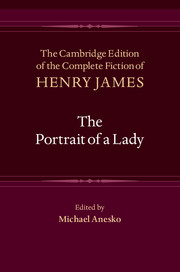Book contents
- Frontmatter
- Contents
- List of Illustrations
- Acknowledgments
- List of Abbreviations
- General Editors’ Preface
- General Chronology of James’s Life and Writings
- Introduction
- Textual Introduction
- Chronology of Composition and Production
- Bibliography
- The Portrait of a Lady
- Glossary of Foreign Words and Phrases
- Notes
- Textual Variants
- Emendations
- Appendices
Chapter 47
Published online by Cambridge University Press: 11 April 2021
- Frontmatter
- Contents
- List of Illustrations
- Acknowledgments
- List of Abbreviations
- General Editors’ Preface
- General Chronology of James’s Life and Writings
- Introduction
- Textual Introduction
- Chronology of Composition and Production
- Bibliography
- The Portrait of a Lady
- Glossary of Foreign Words and Phrases
- Notes
- Textual Variants
- Emendations
- Appendices
Summary
IT was from Henrietta Stackpole that she learned that Caspar Goodwood had come to Rome; an event that took place three days after Lord Warburton's departure. This latter event had been preceded by an incident of some importance to Isabel—the temporary absence, once again, of Madame Merle, who had gone to Naples to stay with a friend, the happy possessor of a villa at Posilippo. Madame Merle had ceased to minister to Isabel's happiness, who found herself wondering whether the most discreet of women might not also by chance be the most dangerous. Sometimes, at night, she had strange visions; she seemed to see her husband and Madame Merle in dim, indistinguishable combination. It seemed to her that she had not done with her; this lady had something in reserve. Isabel's imagination applied itself actively to this elusive point, but every now and then it was checked by a nameless dread, so that when her brilliant friend was away from Rome she had almost a consciousness of respite. She had already learned from Miss Stackpole that Caspar Goodwood was in Europe, Henrietta having written to inform her of this fact immediately after meeting him in Paris. He himself never wrote to Isabel, and though he was in Europe she thought it very possible he might not desire to see her. Their last interview, before her marriage, had had quite the character of a complete rupture; if she remembered rightly he had said he wished to take his last look at her. Since then he had been the most inharmonious survival of her earlier time—the only one, in fact, with which a permanent pain was associated. He left her, that morning, with the sense of an unnecessary shock; it was like a collision between vessels in broad daylight. There had been no mist, no hidden current to excuse it, and she herself had only wished to steer skilfully. He had bumped against her prow, however, while her hand was on the tiller, and—to complete the metaphor—had given the lighter vessel a strain which still occasionally betrayed itself in a faint creaking. It had been painful to see him, because he represented the only serious harm that (to her belief) she had ever done in the world; he was the only person with an unsatisfied claim upon her.
- Type
- Chapter
- Information
- The Portrait of a Lady , pp. 467 - 478Publisher: Cambridge University PressPrint publication year: 2016

